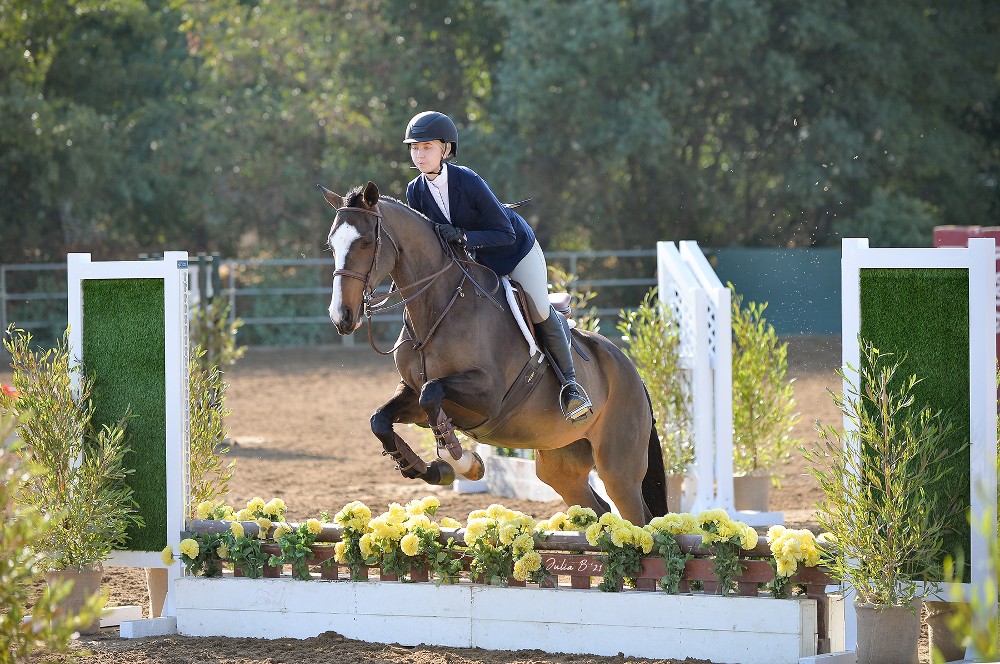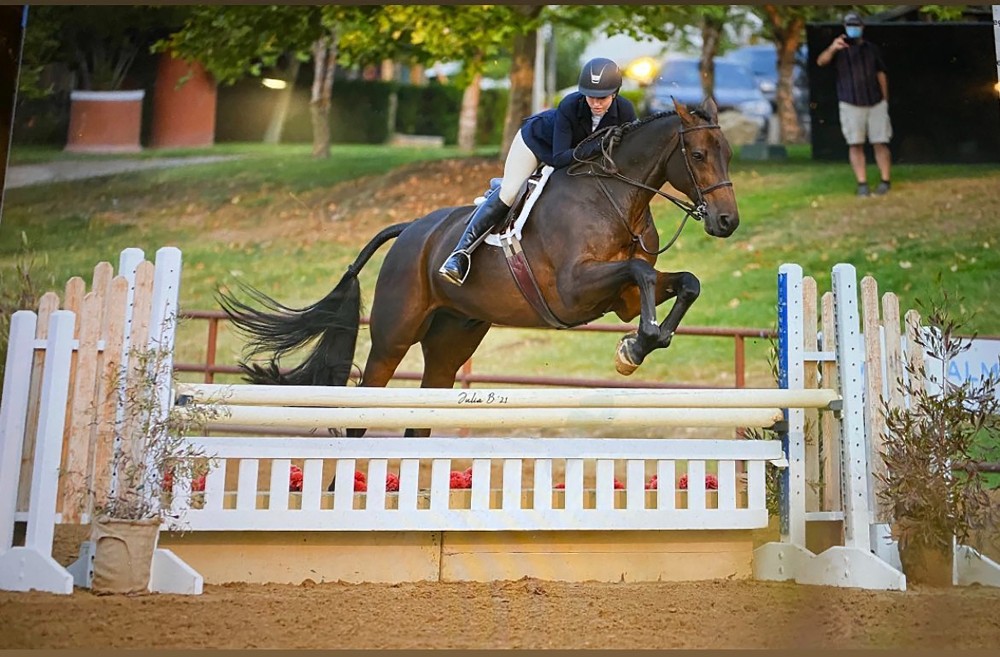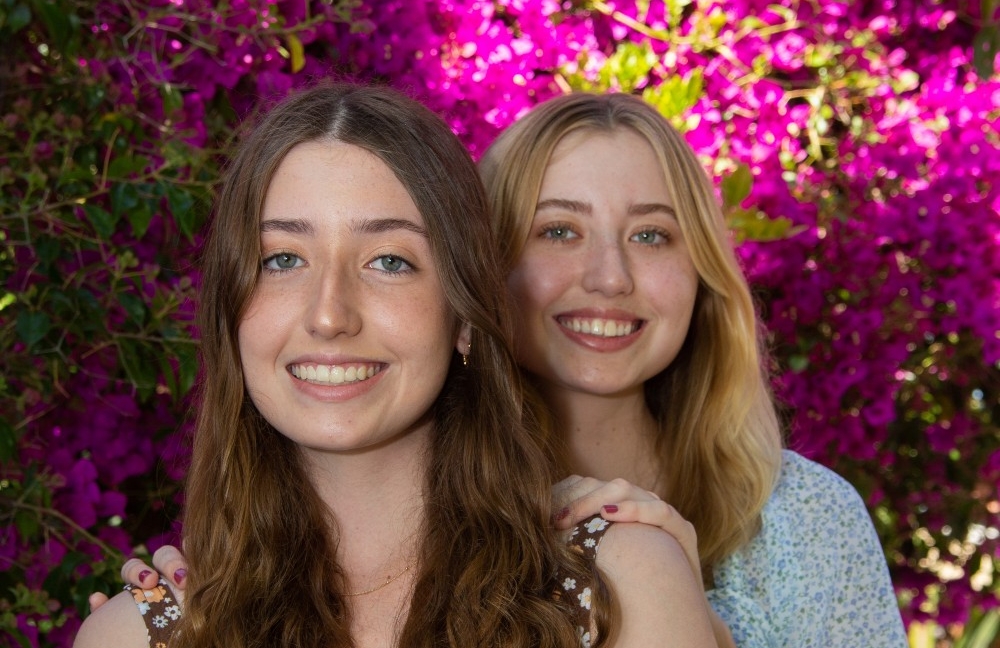By Elizabeth Sloan
A lot of kids love animals. Young girls often dream of riding horses. Curiosity about how the world works has been known to create junior investigators. Sometimes, sisters are best friends.
But how often do these characteristics combine to shape not one but two internationally recognized junior research scientists, champion equestrians, and environmental nonprofit founders—within one family, before the age of 18?
That’s the profile of Iliana and Sabine Close. These sisters from San Carlos have competed in science fairs since fifth grade, winning at local and state levels, and ultimately rising to the International Science and Engineering Fair.
Iliana, a senior at Carlmont High School, was a finalist at ISEF in 2020. Leader of a team that produced “Predicting the Development of POTS (Postural Orthostatic Tachycardia Syndrome) Using Machine Learning and Automated Feature Detection,” the team used a computer algorithm to predict a form of tachycardia, a heart irregularity that can cause fatigue, dizziness and fainting. An outgrowth of earlier work that used algorithms to predict other diseases, the project was a regional grand prize winner before advancing to the world competition of ISEF. (Sadly, ISEF was curtailed by Covid that year and while the fair happened virtually, no awards were given).

An Additional Motivation
“I had a difficult childhood medically,” says Iliana, 17, who suffered from a condition that compromised her health and energy and made attending school challenging. “I always had this idea of revolutionizing diagnostic tools for rare diseases, so patients can get results quicker; not have to watch and wait to determine what’s going on.”
In May, Sabine competed in the 2022 ISEF in Atlanta, Georgia, as team leader of a project entitled “Analysis of Coupled Nonlinear Dynamic Phenomena to Detect Abnormal Movement in Quadrupeds.” The investigation, which uses accelerometers to predict gait anomalies that might lead to lameness in horses, placed fourth in the animal sciences category.
“There’s a lot of animal abuse in the equestrian world, unfortunately,” says Sabine, who just turned 16. “I’ve been around a lot of barns. I have seen how people treat their horses. Some are really great owners. Others overwork their horses, and some go lame. The excuse is always: ‘I didn’t know’.” Attaching sensors to the horse and rider reveals gait disturbances that will take that excuse away, she says.
—
This story appeared in the June edition of Climate Magazine.
—
For both these young scientists, the investigative muse is personal experience—and an unbridled curiosity about how the world works. Sabine’s first foray into research happened because she wondered why bees kept falling into the swimming pool (she used motion sensors to figure it out). Iliana and Sabine love animals, ride horses and compete seriously in equestrian events..
There’s another factor in play, though: science is the Close family business. Mom Sigrid Close is a prominent aerospace engineer and Stanford professor. Dad Greg Close works in human resources at the Lawrence Livermore Labs. Both were at Los Alamo National Labs before the family moved to California.
A Role Model
“We have a very prominent woman in our lives who is a leading woman in STEM (science, technology, engineering and math),” says Iliana. “It’s really empowering to see that. She always encouraged us. We always had the opportunities in STEM if we were interested in pursuing them.”
“My mom is my inspiration,” says Sabine, who remembers settling down on Friday nights to watch television together—not an unusual family activity. In this case, though, what they tuned into was the National Geographic Channel’s “Known Universe”—a show cohosted by their mother.
The Close sisters are a self-proclaimed best friends and mutual support system. They have needed the family culture of encouragement to address one challenge: the lingering discrimination that girls and women often encounter in STEM. According to Iliana and Sabine, this is changing, and often subtle, but still very much alive.
“Especially when I was younger, I would hear comments like “you shouldn’t do that because you’re a girl’,” says Sabine. “I had a teacher who used to tell me to smile more. I noticed he wasn’t saying that to the boys.” It took a conversation with her mother to recognize that the comment was neither useful nor appropriate.
Iliana believes the bigger problem is implicit bias—small, thoughtless ways females are discouraged from pursuing science. “It would be good if the schools worked to recognize (this),” she says. “A lot of times teachers or students will say things that they don’t realize are sexist or discriminating.” Sabine lauds one of her current teachers who is “wonderful” in this regard. “He reminds the class all the time of gender issues.”
Equal Opportunities?
Beyond the comments, there’s the question of opportunity. Is it still different for boys and girls?
“The science program at my school is good,” says Iliana thoughtfully, “but does not emphasize opportunities outside of classroom—the science fairs and camps and competitions. It was in science fair that I realized I had a passion about health and medicine. … If we had grown up in a different family, we would not have had the opportunities we’ve had.”
Iliana and Sabine are passionate about animals. They have two horses and seven other adopted animals—two guinea pigs, two dogs, one cat, and two foster dogs. They ride at the Stanford Red Barn about five days a week and compete at regional, state and national equestrian events, often finding themselves in the winner’s circle for their age group.

“It’s not about the blue ribbons,” insists Sabine. “Winning is nice, but it’s the connection to the animal that is so special.”
“You have to communicate without words,” adds Iliana. “These are living, breathing things–not machines. They have good days and bad days, just like humans.”
In 2020, seeking to raise consciousness about the interrelationship between animals, people, health and the planet, the Close sisters founded EcoLogic. This nonprofit foundation pursues public health research into environmental factors of disease; promotes accessibility of eco-friendly meals for all; and organizes and participates in environmental cleanups. “There is a unique relationship between the environment and animals and people,” says Sabine. “We want to spread awareness.”
Other Activities
The two are also accomplished musicians—piano and trombone for Iliana; piano and trumpet for Sabine. After years of piano lessons, “Music is mostly a way to relax,” says Iliana. Sabine also loves soccer, and the team experience it delivers. With the notoriously demanding junior year of high school coming up, she may have to choose between soccer and riding, says Sabine wistfully.
Like many teenagers, these two sometimes struggle to find balance. Iliana is “very Zen,” according to her mother. She has cultivated an ability to be in the moment and focus on whatever she has to do next. In the fall she will attend Stanford and hopes to study human biology and public health. To discover where in the big field of public health she belongs, “I am planning on trying out a lot of things,” she says. After that, grad school.
Sabine anticipates the last two years of high school presenting even bigger challenges with prioritization and apportioning time. “I plan to take it step by step,” she says. “I have signed up for higher workload classes. I am comfortable now, but I think I will need to keep myself in check about how much I take on.” Among the many interests calling to her are extracurricular internships in subjects ranging from women in leadership to environmental science.
These sisters seem to thoroughly know themselves–and each other. “Iliana is a perfectionist,” asserts Sabine (to her sister’s nods). “She’s never willing to turn in any assignment that is less than perfect.” Asked about Sabine, Iliana offers: “I wouldn’t say she is a perfectionist. She is much more creative than I am. She gets really passionate about things. We have different intellectual strengths. We complement each other.”
Sigrid Close is understandably proud of these two. But she minimizes her and Greg’s role in their success. And she doesn’t cite academic or athletic accolades as the source of her pride. “They are good human beings,” she says simply. “They support each other. They care about people. They care about animals. I don’t know how I got so lucky.”
Iliana and Sabine Close exude serenity and humility. But underneath the calm, unassuming exterior, there is grit in these young women. Asked what advice they would give to younger scientists, especially girls, their answer is simple: Find what they love and never give up– even when they don’t see a path forward; even when it seems impossible.
“Find through experience what you are passionate about and then stick with it,” says Iliana. “Try to stay focused and make it work no matter what. Doors will open.”
“Try everything and anything,” says Sabine. “Think of failure as a success. It tells you one thing that not going to work and you can check it off the list. Don’t be afraid; failure is a really important step to success.”






